Module 9 Population Unit 2 Arnwick was a city with 200,000 people课件38张
文档属性
| 名称 | Module 9 Population Unit 2 Arnwick was a city with 200,000 people课件38张 | 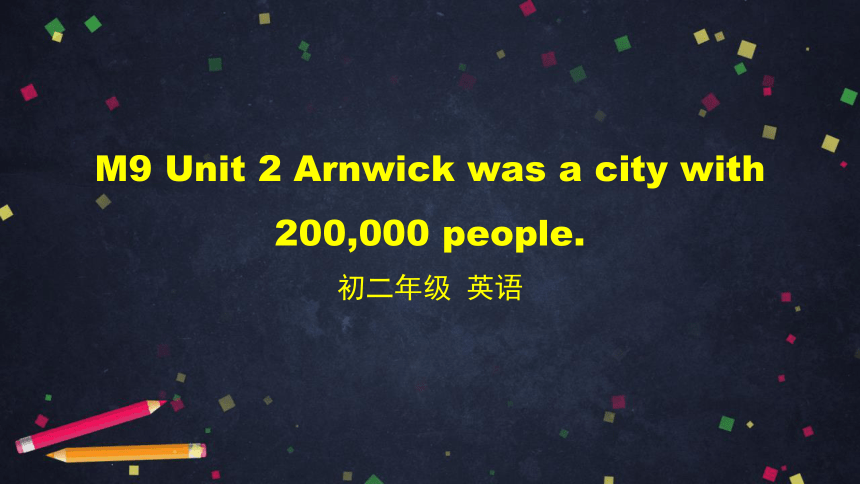 | |
| 格式 | pptx | ||
| 文件大小 | 3.8MB | ||
| 资源类型 | 教案 | ||
| 版本资源 | 外研版 | ||
| 科目 | 英语 | ||
| 更新时间 | 2021-02-20 16:44:59 | ||
图片预览

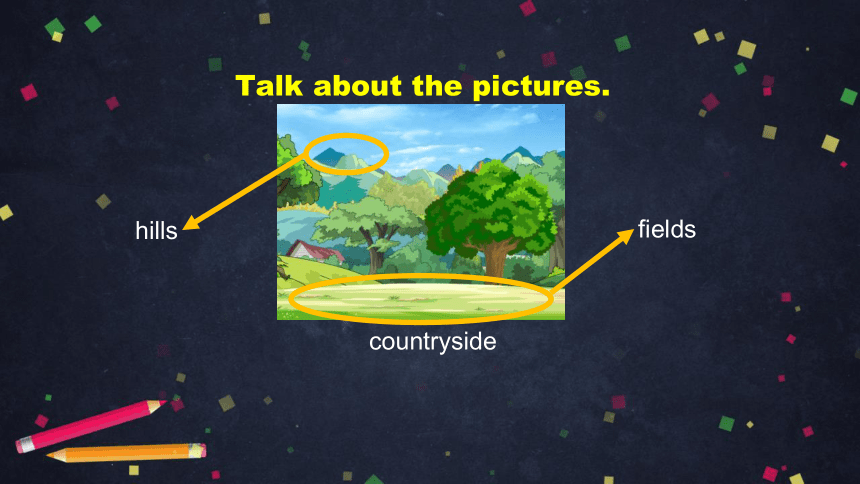
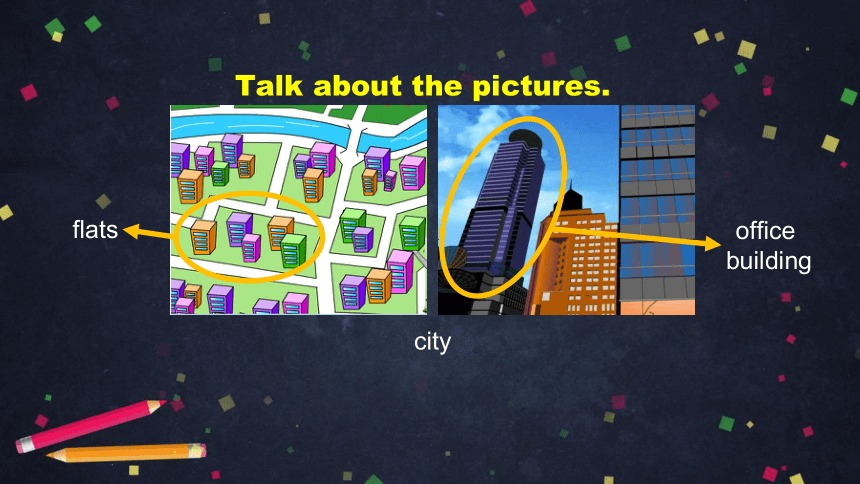
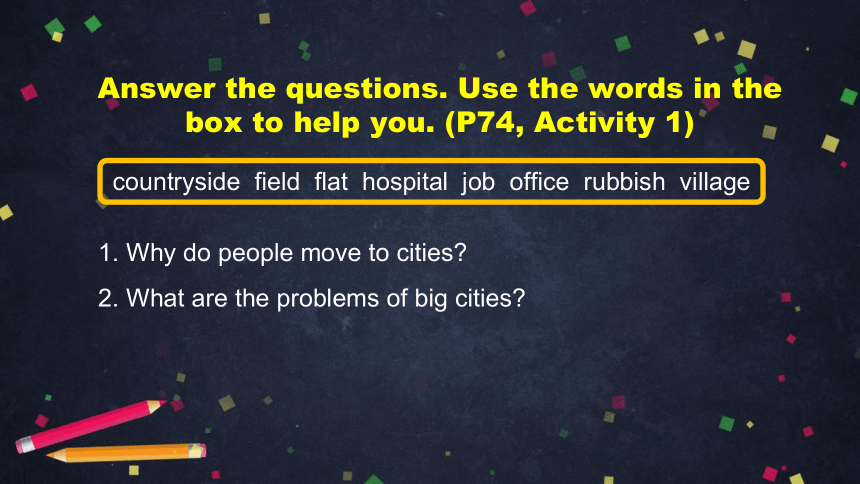
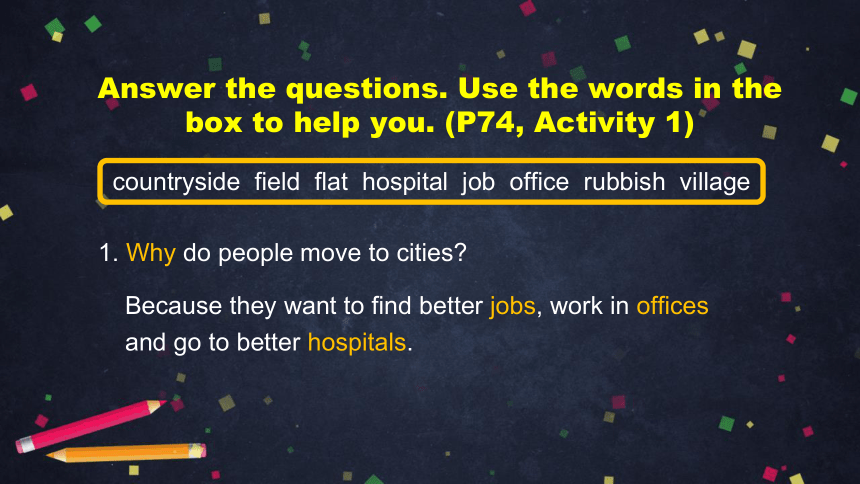
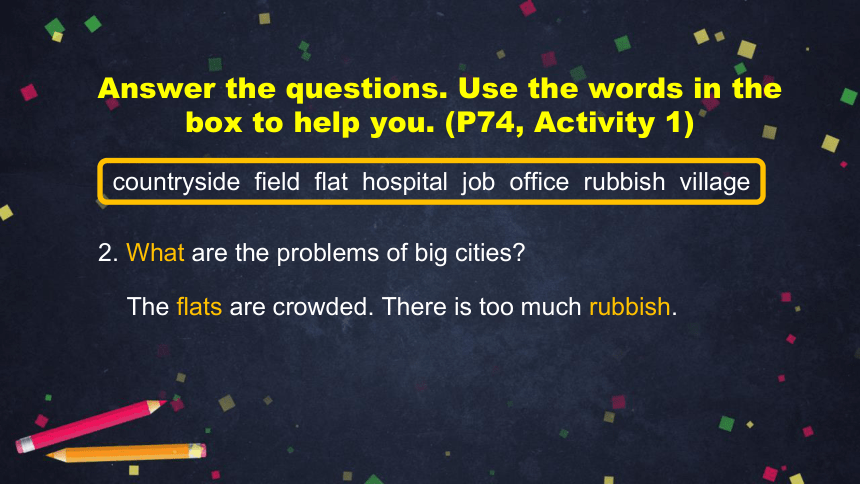
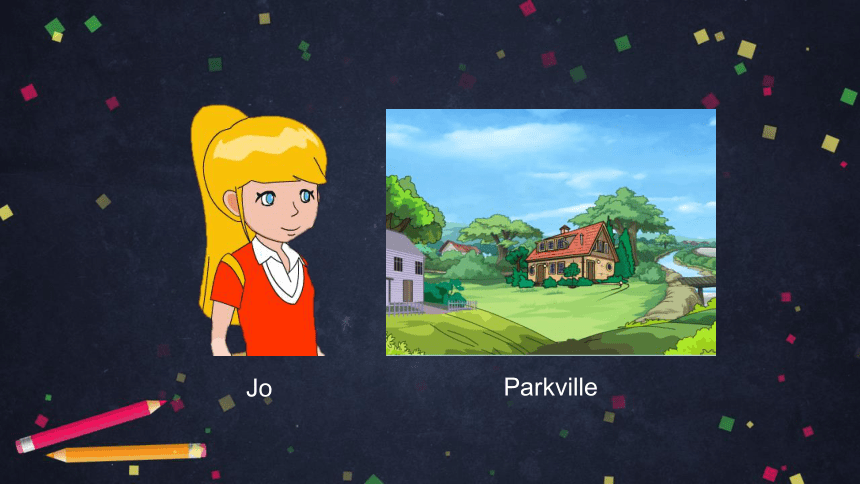
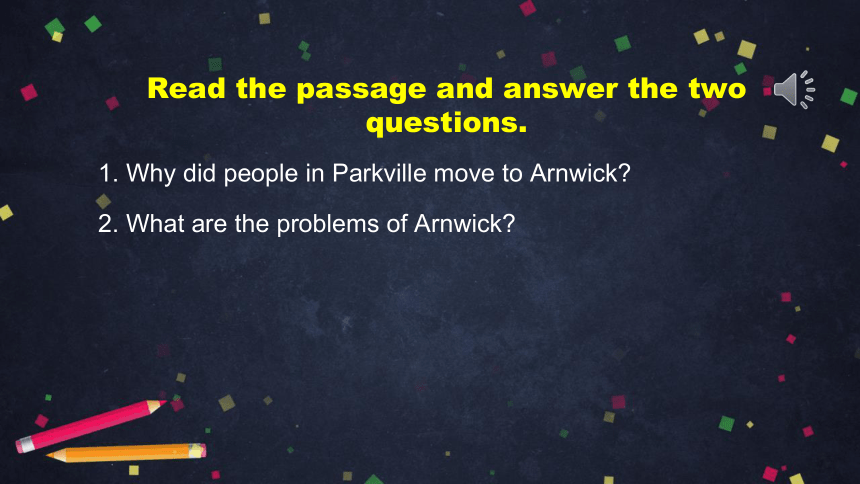

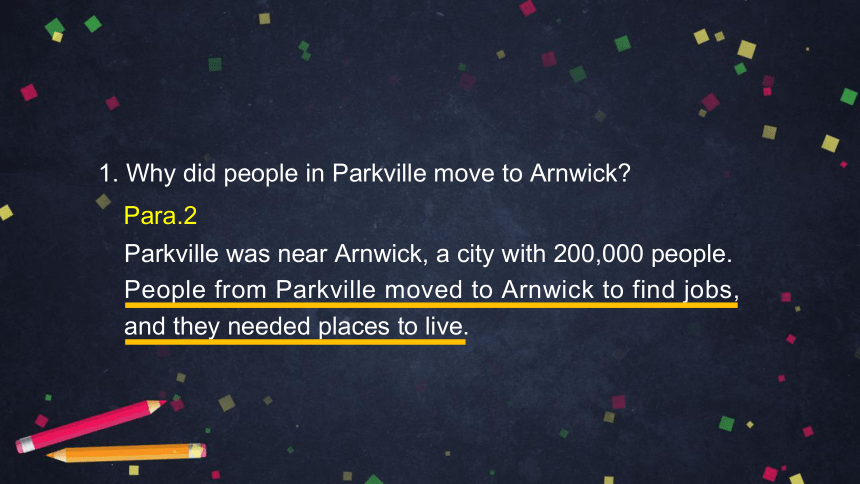
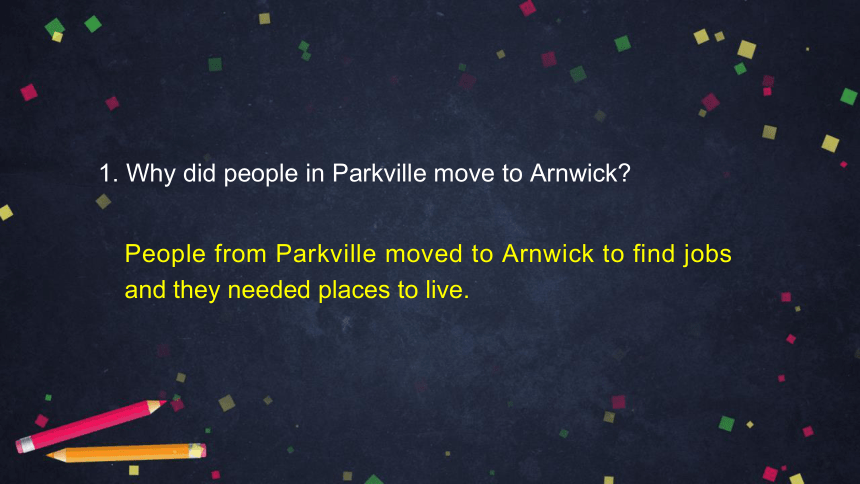
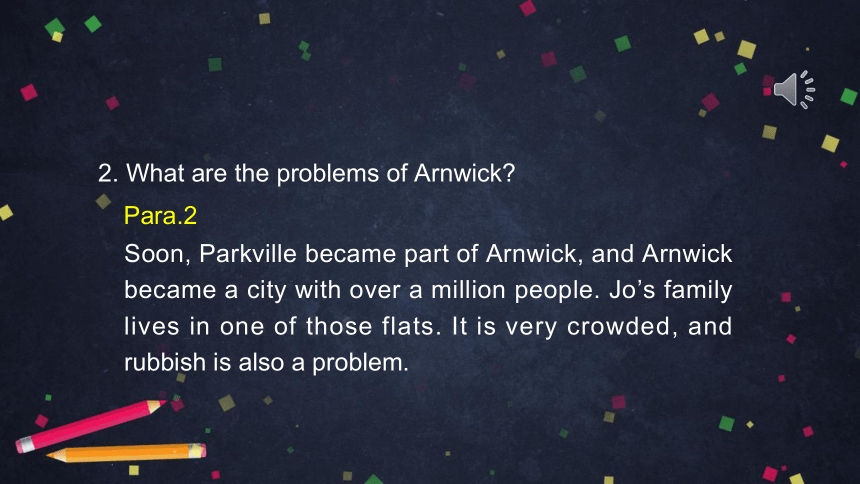
文档简介
M9 Unit 2 Arnwick was a city with 200,000 people.
初二年级 英语
Talk about the pictures.
fields
hills
countryside
city
flats
office
building
Talk about the pictures.
Answer the questions. Use the words in the box to help you. (P74, Activity 1)
countryside field flat hospital job office rubbish village
1. Why do people move to cities?
2. What are the problems of big cities?
countryside field flat hospital job office rubbish village
1. Why do people move to cities?
Because they want to find better jobs, work in offices and go to better hospitals.
Answer the questions. Use the words in the box to help you. (P74, Activity 1)
countryside field flat hospital job office rubbish village
2. What are the problems of big cities?
The flats are crowded. There is too much rubbish.
Answer the questions. Use the words in the box to help you. (P74, Activity 1)
Jo
Parkville
Read the passage and answer the two questions.
1. Why did people in Parkville move to Arnwick?
2. What are the problems of Arnwick?
Parkville was near Arnwick, a city with 200,000 people. People from Parkville moved to Arnwick to find jobs, and they needed places to live.
Para.2
1. Why did people in Parkville move to Arnwick?
Parkville was near Arnwick, a city with 200,000 people. People from Parkville moved to Arnwick to find jobs, and they needed places to live.
1. Why did people in Parkville move to Arnwick?
Para.2
1. Why did people in Parkville move to Arnwick?
People from Parkville moved to Arnwick to find jobs and they needed places to live.
Soon, Parkville became part of Arnwick, and Arnwick became a city with over a million people. Jo’s family lives in one of those flats. It is very crowded, and rubbish is also a problem.
2. What are the problems of Arnwick?
Para.2
2. What are the problems of Arnwick?
Soon, Parkville became part of Arnwick, and Arnwick became a city with over a million people. Jo’s family lives in one of those flats. It is very crowded, and rubbish is also a problem.
Para.2
2. What are the problems of Arnwick?
The small local school in Parkville closed down five years ago, so Jo now has to go to a school in Arnwick with 2,000 pupils. It takes an hour to get there by bus. There is a lot of traffic and pollution.
Para.3
2. What are the problems of Arnwick?
The small local school in Parkville closed down five years ago, so Jo now has to go to a school in Arnwick with 2,000 pupils. It takes an hour to get there by bus. There is a lot of traffic and pollution.
Para.3
2. What are the problems of Arnwick?
The flat is very crowded, and rubbish is also a problem.
There is a lot of traffic and pollution.
Check (√) the true sentences. (P75, Activity 3)
1. Parkville was a quiet village.
2. Arnwick was a city with 20,000 people.
3. Arnwick now has a population of more than one million.
4. The local school in Parkville has 2,000 pupils.
5. Big cities need more money for public services.
Jo is fifteen and lives in Parkville. When Jo’s grandparents first came to Parkville, it was a quiet village. They had a small house, close to fields and hills.
Para.1
1. Parkville was a quiet village.
Jo is fifteen and lives in Parkville. When Jo’s grandparents first came to Parkville, it was a quiet village. They had a small house, close to fields and hills.
Para.1
1. Parkville was a quiet village.
Parkville was near Arnwick, a city with 200,000 people. People from Parkville moved to Arnwick to find jobs, and they needed places to live.
2. Arnwick was a city with 20,000 people.
Para.2
Parkville was near Arnwick, a city with 200,000 people. People from Parkville moved to Arnwick to find jobs, and they needed places to live.
2. Arnwick was a city with 20,000 people.
Para.2
Soon, Parkville became part of Arnwick, and Arnwick became a city with over a million people. Jo’s family lives in one of those flats. It is very crowded, and rubbish is also a problem.
Para.2
3. Arnwick now has a population of more than one million.
Soon, Parkville became part of Arnwick, and Arnwick became a city with over a million people. Jo’s family lives in one of those flats. It is very crowded, and rubbish is also a problem.
Para.2
3. Arnwick now has a population of more than one million.
The small local school in Parkville closed down five years ago, so Jo now has to go to a school in Arnwick with 2,000 pupils. It takes an hour to get there by bus. There is a lot of traffic and pollution.
4. The local school in Parkville has 2,000 pupils.
Para.3
4. The local school in Parkville has 2,000 pupils.
The small local school in Parkville closed down five years ago, so Jo now has to go to a school in Arnwick with 2,000 pupils. It takes an hour to get there by bus. There is a lot of traffic and pollution.
Para.3
It is clear that Arnwick needs more schools, buses and hospitals. It needs fresh air, clean water and better public services. It also needs more police to protect its people. But to do all these things, it needs more money.
5. Big cities need more money for public services.
Para.4
It is clear that Arnwick needs more schools, buses and hospitals. It needs fresh air, clean water and better public services. It also needs more police to protect its people. But to do all these things, it needs more money.
5. Big cities need more money for public services.
Para.4
Think and answer the questions.
1. Can money help solve all these problems?
2. Do we need more big cities like this?
3. Could it be your town some day?
Money can help solve some problems, but not all the problems. For example, money can buy more rubbish bins, but can’t teach people how to sort rubbish.
1. Can money help solve all these problems?
We need more big cities like this because big cities can provide not only more chances for better education and jobs, but also more better living facilities.
2. Do we need more big cities like this?
It could be our town. More and more people go to cities because they want to find better jobs and they need places to live, so there may be some problems, such as rubbish, traffic and pollution.
3. Could it be your town some day?
( )
( )
( )
( )
( )
( )
Check (√) the problems that exist in Beijing.
Many young people want to leave the countryside
because they want to find jobs in the city.
There are not enough schools and hospitals.
Too much traffic brings air pollution.
There is too much rubbish in the streets.
There are not enough police in the city.
It is difficult to get enough clean water.
Write down your suggestions to solve the problems in Beijing.
It’s a good idea to build more universities, set up more companies and create more jobs in the countryside so that young people are willing to stay in their home town.
Many young people want to leave the countryside
because they want to find jobs in the city.
The government should build more schools and hospitals, put in more money, and train more professional teachers, doctors and nurses.
There are not enough schools and hospitals.
The government should develop public transport so that people don’t use their cars so much in big cities. Students can walk, ride bikes or take buses to school.
Too much traffic brings air pollution.
The government should make laws to stop people from throwing away rubbish and put more rubbish bins in the streets. And we can collect the rubbish whenever we see it on the ground.
There is too much rubbish in the streets.
Homework
1. 大声朗读课文;
2. 完成课本第75页活动4;
3. 结合课本第75页活动5,针对北京存在的问题,写出你
的建议。
Thank you!
初二年级 英语
Talk about the pictures.
fields
hills
countryside
city
flats
office
building
Talk about the pictures.
Answer the questions. Use the words in the box to help you. (P74, Activity 1)
countryside field flat hospital job office rubbish village
1. Why do people move to cities?
2. What are the problems of big cities?
countryside field flat hospital job office rubbish village
1. Why do people move to cities?
Because they want to find better jobs, work in offices and go to better hospitals.
Answer the questions. Use the words in the box to help you. (P74, Activity 1)
countryside field flat hospital job office rubbish village
2. What are the problems of big cities?
The flats are crowded. There is too much rubbish.
Answer the questions. Use the words in the box to help you. (P74, Activity 1)
Jo
Parkville
Read the passage and answer the two questions.
1. Why did people in Parkville move to Arnwick?
2. What are the problems of Arnwick?
Parkville was near Arnwick, a city with 200,000 people. People from Parkville moved to Arnwick to find jobs, and they needed places to live.
Para.2
1. Why did people in Parkville move to Arnwick?
Parkville was near Arnwick, a city with 200,000 people. People from Parkville moved to Arnwick to find jobs, and they needed places to live.
1. Why did people in Parkville move to Arnwick?
Para.2
1. Why did people in Parkville move to Arnwick?
People from Parkville moved to Arnwick to find jobs and they needed places to live.
Soon, Parkville became part of Arnwick, and Arnwick became a city with over a million people. Jo’s family lives in one of those flats. It is very crowded, and rubbish is also a problem.
2. What are the problems of Arnwick?
Para.2
2. What are the problems of Arnwick?
Soon, Parkville became part of Arnwick, and Arnwick became a city with over a million people. Jo’s family lives in one of those flats. It is very crowded, and rubbish is also a problem.
Para.2
2. What are the problems of Arnwick?
The small local school in Parkville closed down five years ago, so Jo now has to go to a school in Arnwick with 2,000 pupils. It takes an hour to get there by bus. There is a lot of traffic and pollution.
Para.3
2. What are the problems of Arnwick?
The small local school in Parkville closed down five years ago, so Jo now has to go to a school in Arnwick with 2,000 pupils. It takes an hour to get there by bus. There is a lot of traffic and pollution.
Para.3
2. What are the problems of Arnwick?
The flat is very crowded, and rubbish is also a problem.
There is a lot of traffic and pollution.
Check (√) the true sentences. (P75, Activity 3)
1. Parkville was a quiet village.
2. Arnwick was a city with 20,000 people.
3. Arnwick now has a population of more than one million.
4. The local school in Parkville has 2,000 pupils.
5. Big cities need more money for public services.
Jo is fifteen and lives in Parkville. When Jo’s grandparents first came to Parkville, it was a quiet village. They had a small house, close to fields and hills.
Para.1
1. Parkville was a quiet village.
Jo is fifteen and lives in Parkville. When Jo’s grandparents first came to Parkville, it was a quiet village. They had a small house, close to fields and hills.
Para.1
1. Parkville was a quiet village.
Parkville was near Arnwick, a city with 200,000 people. People from Parkville moved to Arnwick to find jobs, and they needed places to live.
2. Arnwick was a city with 20,000 people.
Para.2
Parkville was near Arnwick, a city with 200,000 people. People from Parkville moved to Arnwick to find jobs, and they needed places to live.
2. Arnwick was a city with 20,000 people.
Para.2
Soon, Parkville became part of Arnwick, and Arnwick became a city with over a million people. Jo’s family lives in one of those flats. It is very crowded, and rubbish is also a problem.
Para.2
3. Arnwick now has a population of more than one million.
Soon, Parkville became part of Arnwick, and Arnwick became a city with over a million people. Jo’s family lives in one of those flats. It is very crowded, and rubbish is also a problem.
Para.2
3. Arnwick now has a population of more than one million.
The small local school in Parkville closed down five years ago, so Jo now has to go to a school in Arnwick with 2,000 pupils. It takes an hour to get there by bus. There is a lot of traffic and pollution.
4. The local school in Parkville has 2,000 pupils.
Para.3
4. The local school in Parkville has 2,000 pupils.
The small local school in Parkville closed down five years ago, so Jo now has to go to a school in Arnwick with 2,000 pupils. It takes an hour to get there by bus. There is a lot of traffic and pollution.
Para.3
It is clear that Arnwick needs more schools, buses and hospitals. It needs fresh air, clean water and better public services. It also needs more police to protect its people. But to do all these things, it needs more money.
5. Big cities need more money for public services.
Para.4
It is clear that Arnwick needs more schools, buses and hospitals. It needs fresh air, clean water and better public services. It also needs more police to protect its people. But to do all these things, it needs more money.
5. Big cities need more money for public services.
Para.4
Think and answer the questions.
1. Can money help solve all these problems?
2. Do we need more big cities like this?
3. Could it be your town some day?
Money can help solve some problems, but not all the problems. For example, money can buy more rubbish bins, but can’t teach people how to sort rubbish.
1. Can money help solve all these problems?
We need more big cities like this because big cities can provide not only more chances for better education and jobs, but also more better living facilities.
2. Do we need more big cities like this?
It could be our town. More and more people go to cities because they want to find better jobs and they need places to live, so there may be some problems, such as rubbish, traffic and pollution.
3. Could it be your town some day?
( )
( )
( )
( )
( )
( )
Check (√) the problems that exist in Beijing.
Many young people want to leave the countryside
because they want to find jobs in the city.
There are not enough schools and hospitals.
Too much traffic brings air pollution.
There is too much rubbish in the streets.
There are not enough police in the city.
It is difficult to get enough clean water.
Write down your suggestions to solve the problems in Beijing.
It’s a good idea to build more universities, set up more companies and create more jobs in the countryside so that young people are willing to stay in their home town.
Many young people want to leave the countryside
because they want to find jobs in the city.
The government should build more schools and hospitals, put in more money, and train more professional teachers, doctors and nurses.
There are not enough schools and hospitals.
The government should develop public transport so that people don’t use their cars so much in big cities. Students can walk, ride bikes or take buses to school.
Too much traffic brings air pollution.
The government should make laws to stop people from throwing away rubbish and put more rubbish bins in the streets. And we can collect the rubbish whenever we see it on the ground.
There is too much rubbish in the streets.
Homework
1. 大声朗读课文;
2. 完成课本第75页活动4;
3. 结合课本第75页活动5,针对北京存在的问题,写出你
的建议。
Thank you!
同课章节目录
- Module 1 How to learn English
- Unit 1 Let's try to speak English as much as possi
- Unit 2 You should smile at her.
- Unit 3 Language in use .
- Module 2 My home town and my country
- Unit 1 It's taller than many other buildings.
- Unit 2 Cambridge is a beautiful city in the east o
- Unit 3 Language in use .
- Module 3 Sports.
- Unit 1 Nothing is more exciting than playing tenni
- Unit 2 This year we training more carefully.
- Unit 3 Language in use .
- Module 4 Planes, ships and trains .
- Unit 1 He lives the farthest from school.
- Unit 2 What is the best way to travel.
- Unit 3 Language in use .
- Module 5 Lao She Teahouse.
- Unit 1 I wanted to see the Beijing Opera.
- Unit 2 It descibes the changes in Chinese society.
- Unit 3 Language in use .
- Module 6 Animals in danger.
- Unit 1 It allows people to get closer to them .
- Unit 2 The WWF is working hard to save them all.
- Unit 3 Language in use .
- Revision module A
- Module 7 A famous story
- Unit 1 Alice was sitting with her sister by the ri
- Unit 2 She was thinking about her cat.
- Unit 3 Language in use .
- Module 8 Accidents
- Unit 1 While the car were changing to red, a car s
- Unit 2 I was trying to pick it up when it bite me
- Unit 3 Language in use .
- Module 9 Population
- Unit 1 The population of China is about 1.37 billi
- Unit 2 Arnwick was a city with 200,000 people.
- Unit 3 Language in use .
- Module 10 The weathe
- Unit 1 It might snow.
- Unit 2 The weather is fine all year round.
- Unit 3 Language in use .
- Module 11 Way of life
- Unit 1 In China ,we open a gift later.
- Unit 2 In England, you usually drink tea with milk
- Unit 3 Language in use .
- Module 12 Help
- Unit 1 What should we do before help arrives?
- Unit 2 Stay away from windows and heavy furniture.
- Unit 3 Language in use .
- Revision module B
